经济学十大原理 pre讲稿
- 格式:docx
- 大小:16.68 KB
- 文档页数:2
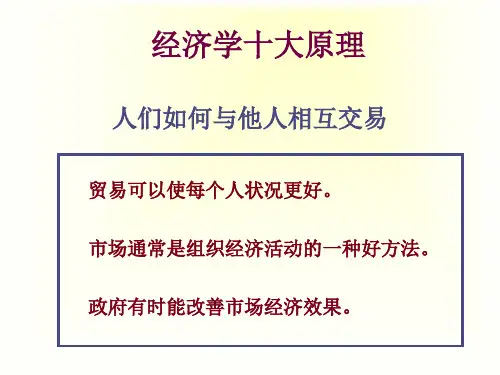
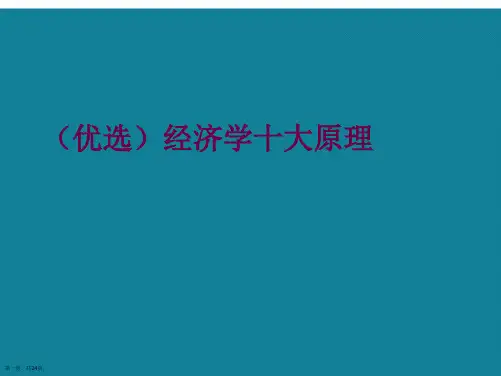
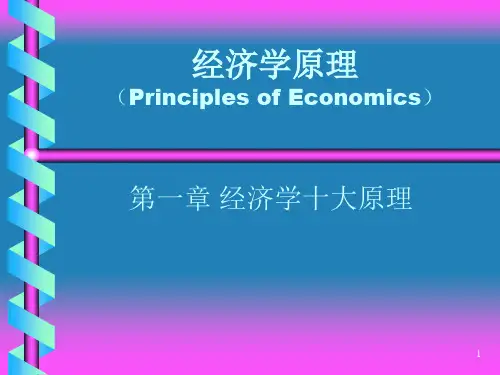


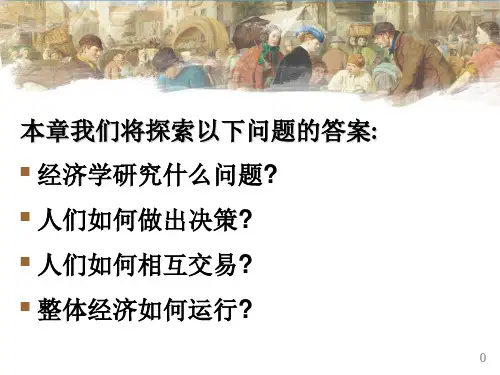
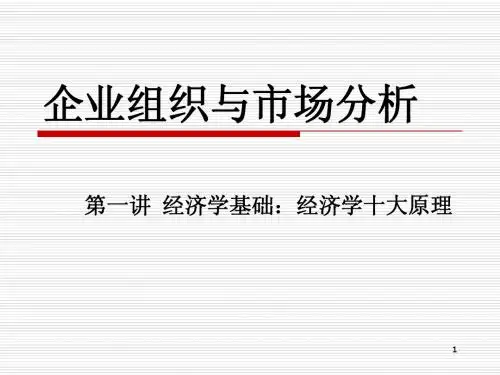
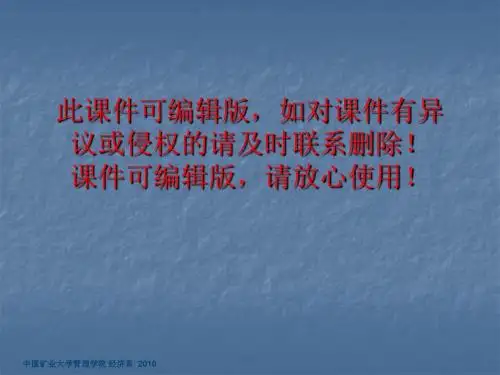
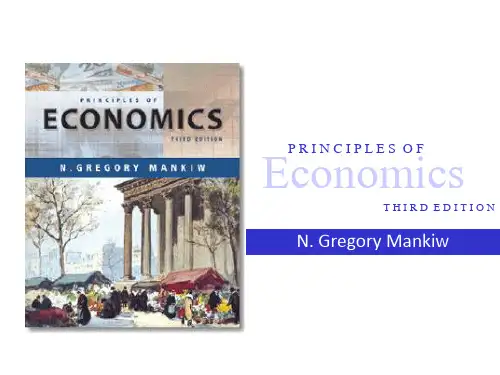
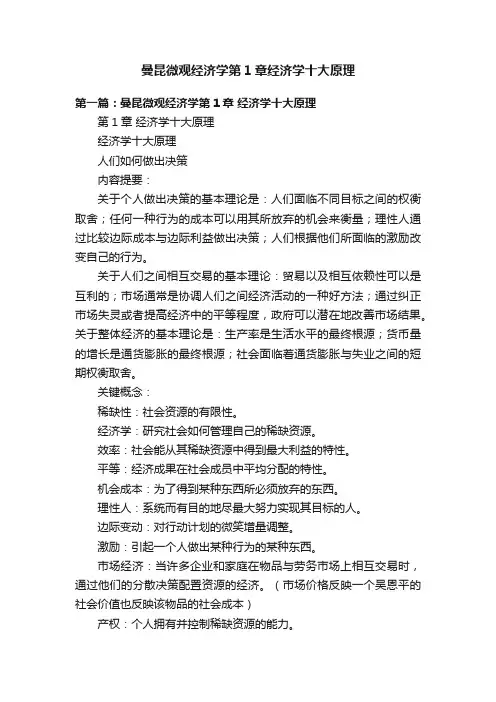
曼昆微观经济学第1章经济学十大原理第一篇:曼昆微观经济学第1章经济学十大原理第1章经济学十大原理经济学十大原理人们如何做出决策内容提要:关于个人做出决策的基本理论是:人们面临不同目标之间的权衡取舍;任何一种行为的成本可以用其所放弃的机会来衡量;理性人通过比较边际成本与边际利益做出决策;人们根据他们所面临的激励改变自己的行为。
关于人们之间相互交易的基本理论:贸易以及相互依赖性可以是互利的;市场通常是协调人们之间经济活动的一种好方法;通过纠正市场失灵或者提高经济中的平等程度,政府可以潜在地改善市场结果。
关于整体经济的基本理论是:生产率是生活水平的最终根源;货币量的增长是通货膨胀的最终根源;社会面临着通货膨胀与失业之间的短期权衡取舍。
关键概念:稀缺性:社会资源的有限性。
经济学:研究社会如何管理自己的稀缺资源。
效率:社会能从其稀缺资源中得到最大利益的特性。
平等:经济成果在社会成员中平均分配的特性。
机会成本:为了得到某种东西所必须放弃的东西。
理性人:系统而有目的地尽最大努力实现其目标的人。
边际变动:对行动计划的微笑增量调整。
激励:引起一个人做出某种行为的某种东西。
市场经济:当许多企业和家庭在物品与劳务市场上相互交易时,通过他们的分散决策配置资源的经济。
(市场价格反映一个吴恩平的社会价值也反映该物品的社会成本)产权:个人拥有并控制稀缺资源的能力。
市场失灵:市场本身不能有效配置资源的情况。
外部性:一个人的行为对旁观者福利的影响。
市场势力:单个经济活动者(或一小群经济活动者)对市场价格有显著影响的能力。
生产率:每一单位劳动投入所生产的物品与劳务数量。
通货膨胀:经济中物价总水平的上升。
经济周期:就业和生产等经济活动的波动。
1.人们面临权衡取舍2.某种东西的成本是为了得到它所放弃的东西3.理性人考虑边际量4.人们会对激励做出反应6.市场通常是组织经济活动的一种好方法7.政府有时可以改善市场结果9.当政府发行了过多货币时,物价上升 10.社会面临通货膨胀与失业之间的短期权衡取舍人们如何相互交易5。
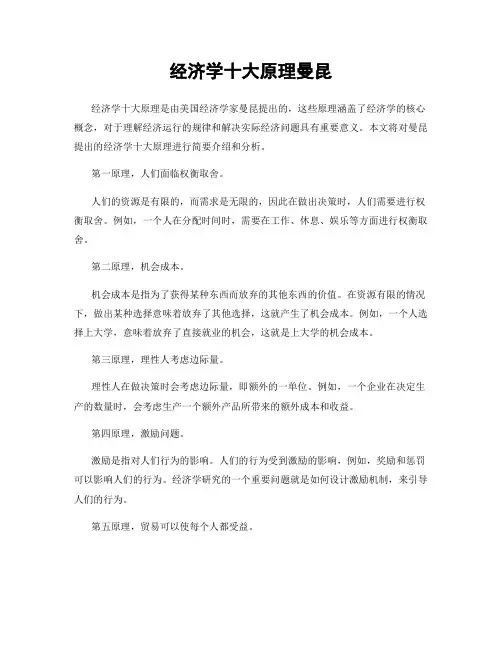
经济学十大原理曼昆经济学十大原理是由美国经济学家曼昆提出的,这些原理涵盖了经济学的核心概念,对于理解经济运行的规律和解决实际经济问题具有重要意义。
本文将对曼昆提出的经济学十大原理进行简要介绍和分析。
第一原理,人们面临权衡取舍。
人们的资源是有限的,而需求是无限的,因此在做出决策时,人们需要进行权衡取舍。
例如,一个人在分配时间时,需要在工作、休息、娱乐等方面进行权衡取舍。
第二原理,机会成本。
机会成本是指为了获得某种东西而放弃的其他东西的价值。
在资源有限的情况下,做出某种选择意味着放弃了其他选择,这就产生了机会成本。
例如,一个人选择上大学,意味着放弃了直接就业的机会,这就是上大学的机会成本。
第三原理,理性人考虑边际量。
理性人在做决策时会考虑边际量,即额外的一单位。
例如,一个企业在决定生产的数量时,会考虑生产一个额外产品所带来的额外成本和收益。
第四原理,激励问题。
激励是指对人们行为的影响。
人们的行为受到激励的影响,例如,奖励和惩罚可以影响人们的行为。
经济学研究的一个重要问题就是如何设计激励机制,来引导人们的行为。
第五原理,贸易可以使每个人都受益。
贸易可以使每个人都受益是因为不同的人有不同的比较优势,通过贸易可以实现资源的有效配置,从而使每个人都受益。
例如,一个国家可以通过贸易获得其他国家生产的商品,从而提高国民生活水平。
第六原理,市场通常是组织经济活动的最有效方式。
市场通过价格机制可以有效地调节资源的配置,使资源流向最需要它的地方。
市场经济可以更好地发挥资源配置的作用,从而提高资源利用效率。
第七原理,政府的存在是改善市场结果的必要条件。
市场虽然可以发挥资源配置的作用,但是在某些情况下市场可能会出现失灵,这时需要政府出面加以调节。
政府可以通过税收、补贴等手段来纠正市场失灵,从而改善市场结果。
第八原理,一国的生活水平取决于它生产物品和服务的能力。
一个国家的生活水平取决于它的生产能力,生产能力取决于劳动生产率和资本存量。
第一章:经济学十大原理前言:学习经济学的目的解释世界经济运动的模式,解释价格运动的潜在原因,人们如何在生活中决策经济事件,解释国家政策带给经济的影响,解析如可应对通货膨胀,通货紧缩,给自己带来的经济影响,等等.参考书籍经济学原理原理一:人们如可做出抉择在生活中人们每天都面临着事情的抉择,例如,你现在是花时间学习经济学,还是花时间去玩游戏。
人们做出抉择对经济的影响在哪?例如,人们是选择把自己的储蓄存放在银行,还是决定投资产业,或者购房?存放在银行,银行的本金多了,贷款给市场的资金就多了,市场的资金多了,又存到银行,银行又贷款给客户,这样市场的总体资金量呈现扩张形式。
假设大部分人选择把钱用于买房,还从银行取钱出来购房,这样房子需求量大了,供给不足,价格上涨,而银行的储蓄下降,市场整体的货币量则成下降趋势,货币量减少,则需求下降,市场的价格下跌。
则,人们做出的选择对经济会产生影响。
原理二:选择的成本是放弃潜在的机会成本在人们做出选择的时候考虑往往是潜在机会成本,一家集团公司,年产量可以产1000量汽车和5000台电脑,如果公司根据市场需求,决定生产500辆汽车和10000台电脑,而多出的5000的电脑成本是放弃了500量汽车的产量,着就是放弃的机会成本,也就是选择陈本。
原理三:选择的导向性不同的选择,考虑完成本后,是什么让人决定选择,事件的选择有潜在的导向性,例如国家银行增加利息,人们就会放弃买房的机会成本选择储蓄的导向性,所以一个国家的政策调控往往可以影响的经济时间段决策,从而调控经济。
原理四:市场运行模式在市场经济中,简化为有家庭和企业,家庭为企业提供生产要素,而企业为家庭提供生产设备,而在一年中,企业所生产出来的所有物品和劳务,为生产率,家庭又购买企业的物品,企业也需要支付生产要素,从而形成了一个经济循环,家庭和企业,一年所生产出来的物品和劳务,为市场“稀缺资源”。
而家庭则购买企业的“稀缺资源”市场的经济的运行模式,就是分配市场”稀缺资源“,如果生产更多的稀缺资源,人们分配的更多,生活自然更美好!也就是生产率提高。
曼昆经济学-经济学⼗⼤原理第⼀章经济学⼗⼤原理在本章中你将—— 知道经济学研究稀缺性资源配置考察⼈们⾯临的⼀些交替关系知道机会成本的含义懂得在作出决策时如何运⽤边际推理讨论激励如何影响⼈们的⾏为考虑为什么⼈们或国家之间的交易可以使各⽅⾯受益讨论为什么市场是⼀种良好的、但并不是完善的资源配置⽅式了解是什么因素决定着整体经济中的某些趋势经济这个词来源于希腊语,其意为“管理⼀个家庭的⼈”。
乍⼀看,这个起源似乎有点奇特。
但事实上,家庭和经济有着许多共同之处。
⼀个家庭⾯临着许多决策。
它必须决定哪些家庭成员去做什么.以及作为回报每个家庭成员能得到什么:谁做晚饭?谁洗⾐服?谁在晚餐时多得到⼀块甜点?谁有权选择看什么电视节⽬?简⾔之,家庭必须考虑到每个成员的能⼒、努⼒和愿望,以在各个成员中配置稀缺资源。
和家庭⼀样,⼀个社会也⾯临着许多决策。
⼀个社会必须决定将要做哪些⼯作和谁做这些⼯作。
社会需要⼀些⼈种粮⾷,另⼀些⼈做⾐服,还有⼀些⼈设计电脑软件。
⼀旦社会分配⼈们(以及⼟地、建筑物和机器)去做各种⼯作,它还应该分配他们⽣产的物品与劳务量。
社会必须决定谁将吃鱼⼦酱⽽谁将吃⼟⾖。
它还必须决定谁将开保时捷跑车⽽谁将坐公共汽车。
由于资源稀缺,社会资源的管理就是重要的。
稀缺性是指社会提供的东西少于⼈们想拥有的。
正如⼀个家庭不能给每个成员想要的每⼀件东西⼀样,⼀个社会也不能给每个⼈以他们向往的最⾼⽣活⽔平。
经济学研究社会如何管理⾃⼰的稀缺资源。
在⼤多数社会中,资源并不是由⼀个中央计划者来配置,⽽是通过千百万家庭和企业的共同⾏动来配置的。
因此,经济学家研究⼈们如何作出决策:他们⼯作多少,购买什么,储蓄多少,以及如何把储蓄⽤于投资。
经济学家还研究⼈们如何相互交易。
例如,经济学家探讨⼀种物品众多的买者与卖者如何共同决定该物品的销售价格和销售量。
最后,经济学家分析影响整个经济的⼒量和趋势。
包括平均收⼊的增长,⼈⼝中找不到⼯作的⼈的⽐例,以及价格上升的速度。
Good morning everyone! Today, I will introduce something about the principles of economics. What I will share with you now is from a book called principles of economics written by Mankiw. Economics is the study of how society manages its scarce resources. Economists study how people make decisions: how much they work, what they buy, how much they save, and how they invest their savings. Economists also study how people interact with one another. For instance, they examine how the multitude of buyers and sellers of a good together determine the price at which the good is sold and the quantity that is sold. Finally, economists analyze forces and trends that affect the economy as a whole, including the growth in average income, the fraction of the population that cannot find work, and the rate at which prices are rising. During studying these problems, economists found ten principles of economics.Because the behavior of an economy reflects the behavior of the individuals who make up the economy, we start our study of economics with four principles of individual Decision making.They area)People face tradeoffsb)The cost of something is what you give up get itc)Rational people think at the margind)People respond to incentivesAs we go about our lives, many of our decisions affect not only ourselves but other people as well. The next three principles concern how people interact with one another.They area)Trade can make everyone better offb)Markets are usually a good way to organize economic activityc)Governments can sometimes improve market outcomesAll these decisions and interactions together make up “the economy.”The last three principles concern the workings of the economy as a whole.They area) A country’s standard of living depends on its ability to produce goods and servicesb)Prices rise when the government prints too much moneyc)Society faces a short run tradeoff between inflation and unemploymentNow I want to introduce the three principles in the second part.The first one is Trade can make everyone better off.We live better because we trade. If we isolate from others, we would need would need to grow our own food,make our own clothes, and build our own home.Trade allows each person to specialize in theactivities he or she does best, whether it is farming, sewing, or home building. Bytrading with others, people can buy a greater variety of goods and services at lower cost. Countries as well as families benefit from the ability to trade with one another. Trade allows countries to specialize in what they do best and to enjoy a greater variety of goods and services. Although maybe they are competitors, trade still makes them better off.The second one is Markets are usually a good way to organize economic activity. Today, most countries that once had centrally planned economies are developingmarket economies.In a market economy, firms decide whom to hire and what to make, and households decide which firms to work for and what to buy with their incomes.In his 1776 book An Inquiry into the Nature and Causes of the Wealth of Nations, economist Adam Smith made the most famous observation in all of economics:Households and firms interacting in markets act as if they are guided by an “invisiblehand” that leads them to desirable market outcomes. Prices are the instrument with which the invisiblehand directs economic activity. Prices reflect both the value of a good to societyand the cost to society of making the good. Because households and firms look atprices when deciding what to buy and sell, they unknowingly take into accountthe social benefits and costs of their actions. As a result, prices guide these individualdecisionmakers to reach outcomes that, in many cases, maximize the welfareof society as a whole.Today I bring a short video about “invisible hand”and “visible hand”.Then let’s talk about the visible hand government. Governments can sometimes improve market outcomes.There are two broad reasons for a government to intervene in the economy: to promote efficiency and to promote equity. That is,most policies aim either to enlarge the economic pie or to change how the pie isdivided.The invisible hand usually leads markets to allocate resources efficiently.Nonetheless, for various reasons, the invisible hand sometimes does not work.Economists use the term market failure to refer to a situation in which the marketon its own fails to allocate resources efficiently.One possible cause of market failure is an externality. An externality is the impact of one person’s actions on the well-being of a bystander. For example, there is a chemical factory near your house polluting the river day and night and you cannot get the clean water. Without the government, the factory would pay anything for pollution. And the cost of producing is less then what the factory cost.Another possible cause of market failure is market power. Market power refers to the ability of a single person (or small group of people) to unduly influencemarket prices, we called monopoly. To say that the government can improve on markets outcomes at times doesnot mean that it always will.That’s all, thank you!。